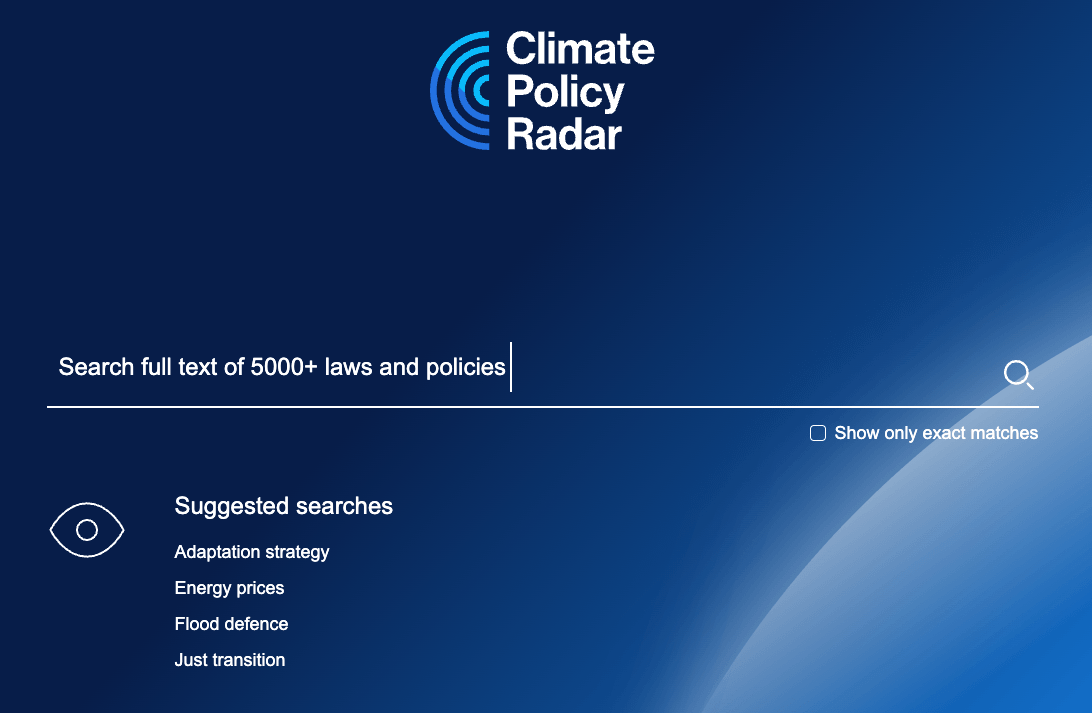Climate Policy Radar, a London-based startup leveraging data science and artificial intelligence to track climate change policies and laws on a global scale, has today confirmed a raise of over $6.8 million in new funding.
The figure represents a culmination of grant funding provided by philanthropists and foundations including the Environmental Defence Fund (EDF), Google.org, Open Society Foundations (OSF), The Patrick J. McGovern Foundation, Sequoia Climate Foundation, Schmidt Futures (the philanthropic initiative founded by Eric and Wendy Schmidt), and continued support from existing backer Quadrature Climate Foundation (QCF).
According to Climate Policy Radar founder Dr. Michal Nachmany, the latest round of financial backing will be used to fuel continued product development, a project which will see the organisation embark on a sustained recruitment drive.
“No sensible decision can be made any longer without taking into account not only the world as it is, but the world as it will be.” - Isaac Asimov
While the drive towards lowering global carbon levels and increased resilience to climate change can be seen in just about everything we interact with on a daily basis, change of this magnitude doesn’t happen overnight, and involves the interaction of multiple factions, hopefully, working hand in hand to achieve a common goal.
Informed decisions

Where Climate Policy Radar steps into the picture is by providing organisations and individuals access to an open-source knowledge base that presents concise, digestible, and accurate data related to climate laws and policies to make informed decisions.
While this might be a seemingly straightforward process, speaking with Climate Policy Radar founder Dr. Michal Nachmany, it’s anything but.
“The average policy document is around 80 pages in length, complex to digest, often presented in any number of formats and languages, some including photos, graphs, etc., the information users are looking for is in there, but it can be quite the challenge to find it in a timely manner,” says Nachmany. “We are working with messy, massive amounts of unstructured textual data.”
Unstructured to structured
Working in collaboration with the Grantham Research Institute on Climate Change and the Environment at LSE, Climate Policy Radar is leveraging data science and AI methods to convert this haystack of unstructured text from climate policy and legal documents into structured and neatly presented information where needles can be found in a fraction of the time of current methods, and analysis becomes easier.

At present the startup says it has nearly 350,000 users from over 100 countries accessing the 6,000+ documents accounting for over half a million pages of national climate laws, policies and UNFCCC submissions in its database, all fully searchable and translated to English.
Big data, and growing
Moving forward, and thanks in part to the fresh $6.8 million, Climate Policy Radar has plans to broaden its sources and available data to include subnational policies, climate-related litigation cases, corporate disclosures, reports from statutory bodies including central banks and national audit offices, and publications from industry bodies.
Climate Policy Radar makes no secret about the fact that a large portion of the heavy lifting is powered by AI, however, Nachmany is quick to point out that while it is currently developing generative AI for document summaries, it’s well beyond a "ChatGPT for climate policy". The startup uses bespoke domain-informed taxonomies and classifiers and takes an ‘augmented intelligence’-focused approach to leverage a human-machine partnership, rather than a purely artificial intelligence approach.
While the company was featured by OpenAI at the launch of ChatGPT-4, Climate Policy Radar uses open-source LLMs as the basis of all of its work, publishing all of its data and code openly. Commenting on the startups' transparency and mitigation of AI-related risks such as bias and hallucination, Nachmany said:
“There are no black boxes here. We actively invite the community to help us detect issues and improve on our work. This is too important to get wrong”.
Lead image: Climate Policy Radar team. Photos: Krystal Thompson Photography.



Would you like to write the first comment?
Login to post comments